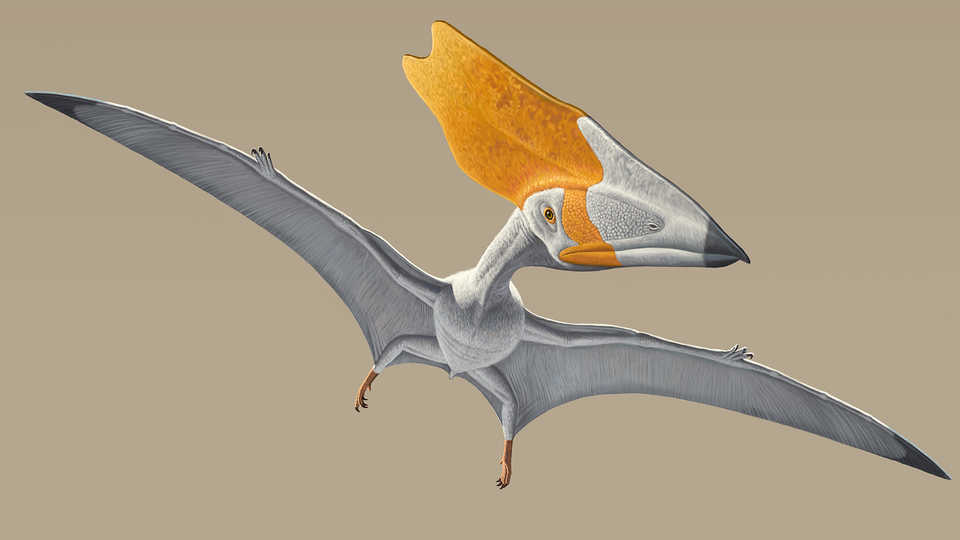The California Academy of Sciences is home to an aquarium, planetarium, natural history museum, and research and education programs, which engage people of all ages and backgrounds on two of the most important topics of our time: life and its sustainability. Admission to the Academy is: $34.95 for adults; $29.95 for youth ages 12 to 17, Seniors ages 65+, and students with valid ID; $24.95 for children ages 4 to 11; and free for children ages 3 and younger. Admission fees include all exhibits and shows. Hours are 9:30 am - 5:00 pm Monday - Saturday, and 11:00 am - 5:00 pm on Sunday. During peak periods, including some holiday weekends, extended hours may apply. Visit www.calacademy.org or call (415) 379-8000 for more.
Learn about ancient flying creatures, explore human diversity, and encounter the first full solar eclipse since 1918

Thalassodromeus (illustration) © AMNH 2014
New Exhibit!
Pterosaurs: Flight in the Age of Dinosaurs
Opening May 19, 2017
For as long as dinosaurs walked the Earth, ancient flying animals called pterosaurs ruled the skies. Not classified as birds, bats, or dinosaurs—these extraordinary winged reptiles adapted for life in the air and were the first vertebrates to evolve powered flight. In this revealing new exhibit, explore rare fossils and discover the amazing diversity and evolution of these ancient creatures. Walk beneath a life-size model of the largest animal to ever navigate the skies and marvel at its colossal size. View a fabulous array of real pterosaur skulls alongside colorful illustrations of head crests. “Soar” through the sky and virtual prehistoric landscapes within a “Fly like a Pterosaur” interactive.
Pterosaurs: Flight in the Age of Dinosaurs is organized by the American Museum of Natural History, New York (www.amnh.org).
Penguins + Pajamas Sleepover
Friday May 5
Ages 5-17, with adult chaperone
Why count sheep when you can count geckos and butterflies? Sleepovers let you explore the Academy after-hours, then snuggle up in your pajamas and sleeping bags at a location of your choice. Includes a bedtime story and snack, plus breakfast and Academy admission the following day.
$89 members, $109 non-members. Registration required. Visit calacademy.org/sleepovers for program details and registration.
Leakey Lecture
Humankind: How Biology and Geography Shape Human Diversity
Tuesday May 9 | 7 pm
African Hall
Dr. Alexander Harcourt, Professor Emeritus of Anthropology, University of California, Davis
Humanity’s expansion around the world from our African origins is astounding. How did we spread across the globe? Why do people from different regions vary? Is our diversity a function of geography, adaptation, or both? Join anthropologist Dr. Alexander Harcourt as he explores how humanity’s interaction with the environment can explain why we differ biologically and culturally from one region of the world to another.
Leakey Lectures are presented in partnership with the Leakey Foundation.
Reservations required. $12 Academy members, Leakey Foundation members and seniors; $15 non-members. Seating is limited.
Benjamin Dean Astronomy Lecture
The Great American Eclipse
Monday May 1 | 7:30 pm
Morrison Planetarium
Dr. Laura Peticolas, Space Science Laboratory, UC Berkeley
Mark your calendars for August 21, 2017 for the first total solar eclipse in the US in almost 100 years! This monumental astronomical event will bring people from around the world to the United States to experience and to perform scientific research experiences, while also creating a motivation for communities throughout the U.S. to understand simple orbital dynamics and the practices of astronomical research. Dr. Peticolas will provide an overview of the upcoming 2017 total solar eclipse, describe some potential scientific research that will result during this eclipse, plus discuss the “Eclipse Megamovie” in progress by scientists, researchers, filmmakers and other individuals to document the eclipse corona from images taken from Oregon to South Carolina.
Reservations required. $12 members and seniors; $15 non-members.
Ongoing Events at the California Academy of Sciences
Butterfly Am I
Daily, 11 am
Piazza
Do you have what it takes to be a butterfly? This theatrical program features pro-tips for success–from a butterfly's point of view. Don’t forget to visit a dazzling new butterfly emergence chamber in the Osher Rainforest!
Pollinator Power
Monday through Friday, 11:15 am
Saturday and Sunday, 2:15 pm
Living Roof
Butterflies, bats, and bees—oh my! Join us atop the Academy’s Living Roof for a peek into the lives of local pollinators and discover how these creatures keep humans and habitats healthy. Weather permitting.
Family Nature Crafts
Saturday and Sunday, 10 am
By the Swamp
This kid friendly, nature-inspired activity is fun for the whole family! The first two weekends in May feature a craft about the life cycle of butterflies, while the last two weekends will feature a fun craft activity about high-flying pterosaurs. Supplies are limited and parental supervision is required.
Press Contacts
If you are a journalist and would like to receive Academy press releases please contact press@calacademy.org.
Digital Assets
Hi-res and low-res image downloads are available for editorial use. Contact us at press@calacademy.org to request access.